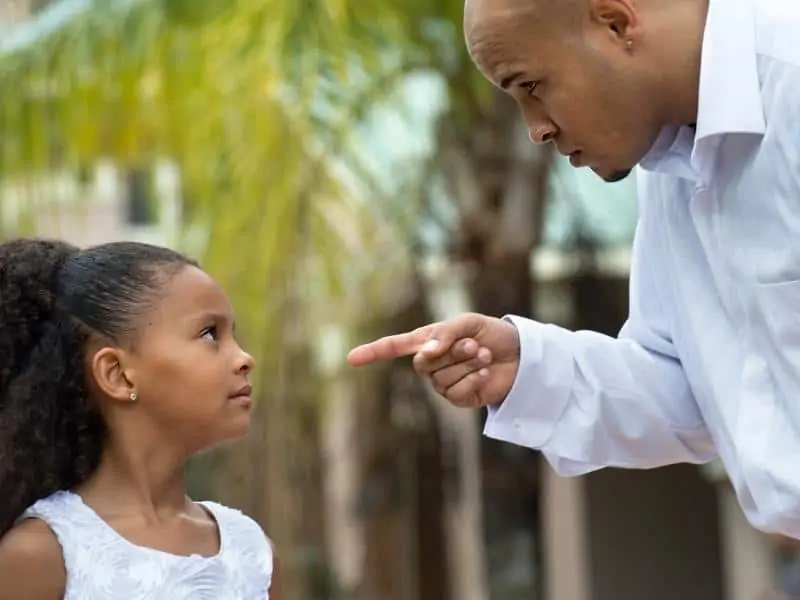Should Parents Be a Child’s Disciplinarian or Their Best Friend?

This post may contain affiliate links. If you buy through the link, I may earn a commission. Learn More.
I never thought it was the parent’s job to be a child’s best friend.
It’s the parent’s job to be friendly, certainly, but it’s also their job to teach their children how to grow into productive, respectful, self-sufficient adults.
Doing that requires at least some discipline.
*FYI, some of the links in this article about should parents be a child’s disciplinarian or their best friend may be affiliate links. If you click and make a purchase, we may get a commission (at no extra cost to you). For more info, please see our disclaimer.
Should Parents Be Disciplinarians or Best Friends?
Parents should try to find the middle ground between strict disciplinarian and best friend. Children need rules and structure, but discipline cannot be so strong that it backfires. Likewise, a parent who focuses too much on friendship might not effectively guide children as they grow.
This question isn’t an easy one to answer. As parents, we want to be friends with our children.
However, most of us realize that friendship is secondary to creating boundaries that give children a feeling of safety and security.
What Are the Different Styles of Parenting?
I asked my children what they thought of this question. “Would you rather I be a strict disciplinarian or a best friend?”
Their answers didn’t surprise me. Both my son and daughter answered that they like a blend.
Neither wanted to feel the burdens of telling me everything like they would their best friends. Both said they like having a parent who has strong guidelines.
Even my son, now a teenager, said he feels like he doesn’t always make the right choices. Having a parent who’s a parent first and a friend second lets him know he has someone there to catch him when he falls.
The parental safety net doesn’t mean you can’t have a friendly relationship with your children. It simply means that children need to know they can depend on you as an authority figure.
Related: How to Tell Someone They Are a Bad Parent?
Authoritative Parenting
The main problem we have with disciplinarian parenting is the “all-or-nothing” ideal.
Being a disciplinarian doesn’t mean you have to use corporal punishment. It simply means that you have rules, and you enforce them.
Children thrive when there are rules in place. Families that choose to go the no rules route often have problems with behavior seen in homes where rules are enforced.
Even the CDC states that rules are necessary for helping children understand their place in the world.
Having rules is important. Having unreasonable rules is not. When you make rules for your house, always have an important reason you can share with your children.
If you can’t explain why you have a rule, then you probably need to rethink it.
Pro-Tip
Having reasons for your rules isn’t to say that you have to explain yourself to your kids.
But from the standpoint of trying to raise kids who can reason and rationalize well, it helps them understand why you don’t want them to go over to that friend’s house or why you don’t want them to cross the street.
Age-appropriate explanations can help your kids start forming their own logic for why things are the way it is.
Attachment Parenting

Attachment parenting creates a strong emotional bond between a parent and their child. It’s not the polar opposite of authoritative parenting.
It’s simply a focus on the feelings and sensitivities of a child rather than strict discipline.
There is nothing wrong with attachment parenting. It’s a wonderful thing to give a child the care and concern they need when they need it.
It can become an issue when parents take the word “attachment” to mean responding to every whim.
It becomes even more difficult when parents misuse the phrase to mean being best buds with their children.
We all have examples of parents who cross a strange line with their kids.
Buying alcohol for underage children, allowing regular truancies from school or helping them cheat on their homework is negligence, not friendship.
Related: How Much Freedom Should Parents Give Their Children?
Friendly/Secure Parenting
The secret behind friendly parenting is knowing where that line is between carelessness and tyranny. It’s a line that moves as children age.
When they are babies and toddlers, they need someone who will watch out for their safety and well-being. That requires fairly strict rules.
As they grow, they need someone who will spend time with them but also give them comfort and reliability. They need a friendly parent who still has rules that must be followed.
Adult children are different. As we age, our parents are hopefully still there to offer us advice and guidance, but a friendship may develop.
There are some guidelines to keep in mind when trying to be friends with adult children.
Parenting is About Finding a Balance
There is no reason a parent has to be a tyrant, but that doesn’t mean they should be best friends with their children either.
Do you agree or disagree with this? We would love to hear your thoughts. Talk with us in the comments!
Have You Read These Yet?
- Are Strict Parents Good or Bad?
- Should Parents Respect Their Children?
- Should Parents Have to Earn Respect From Their Children?
